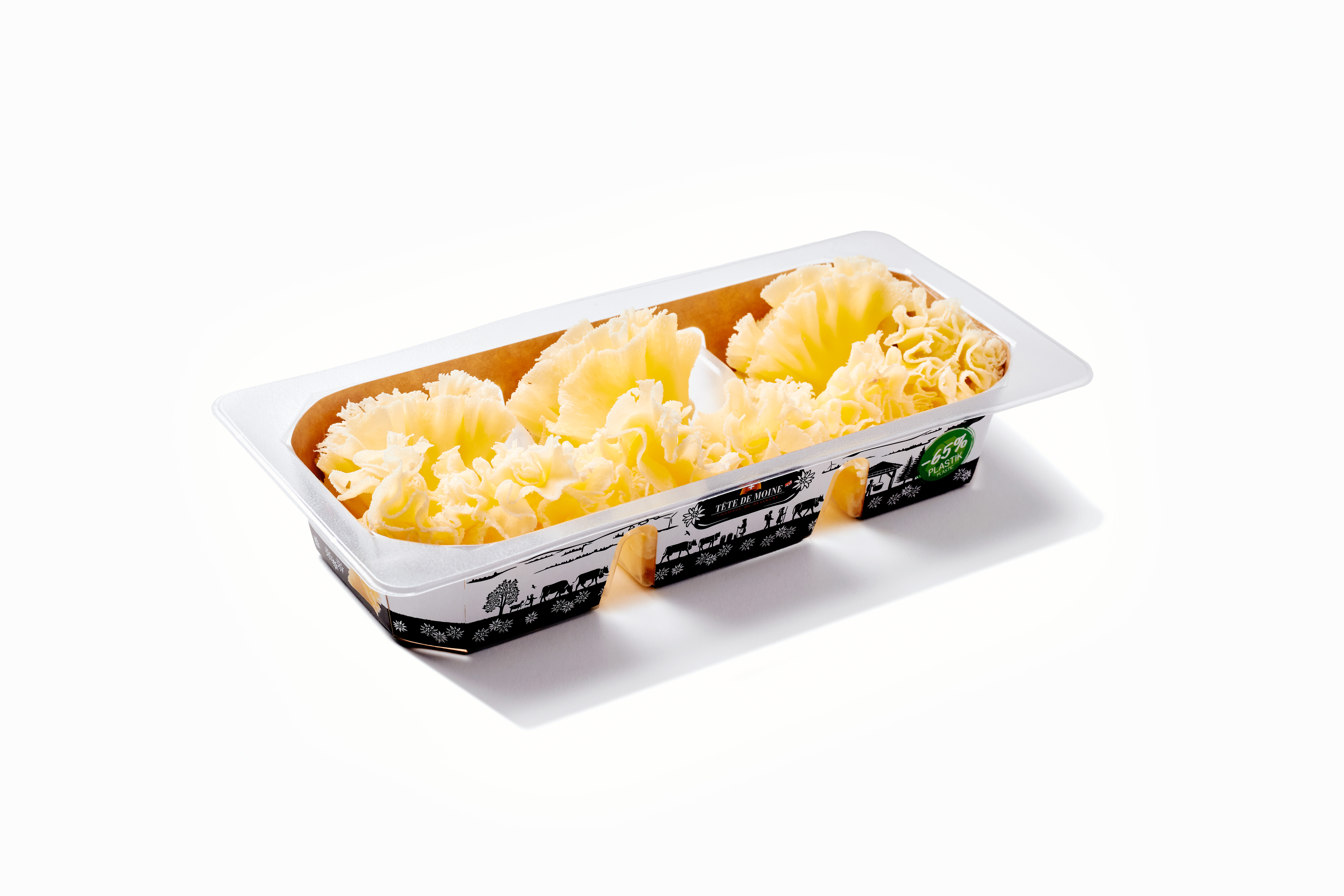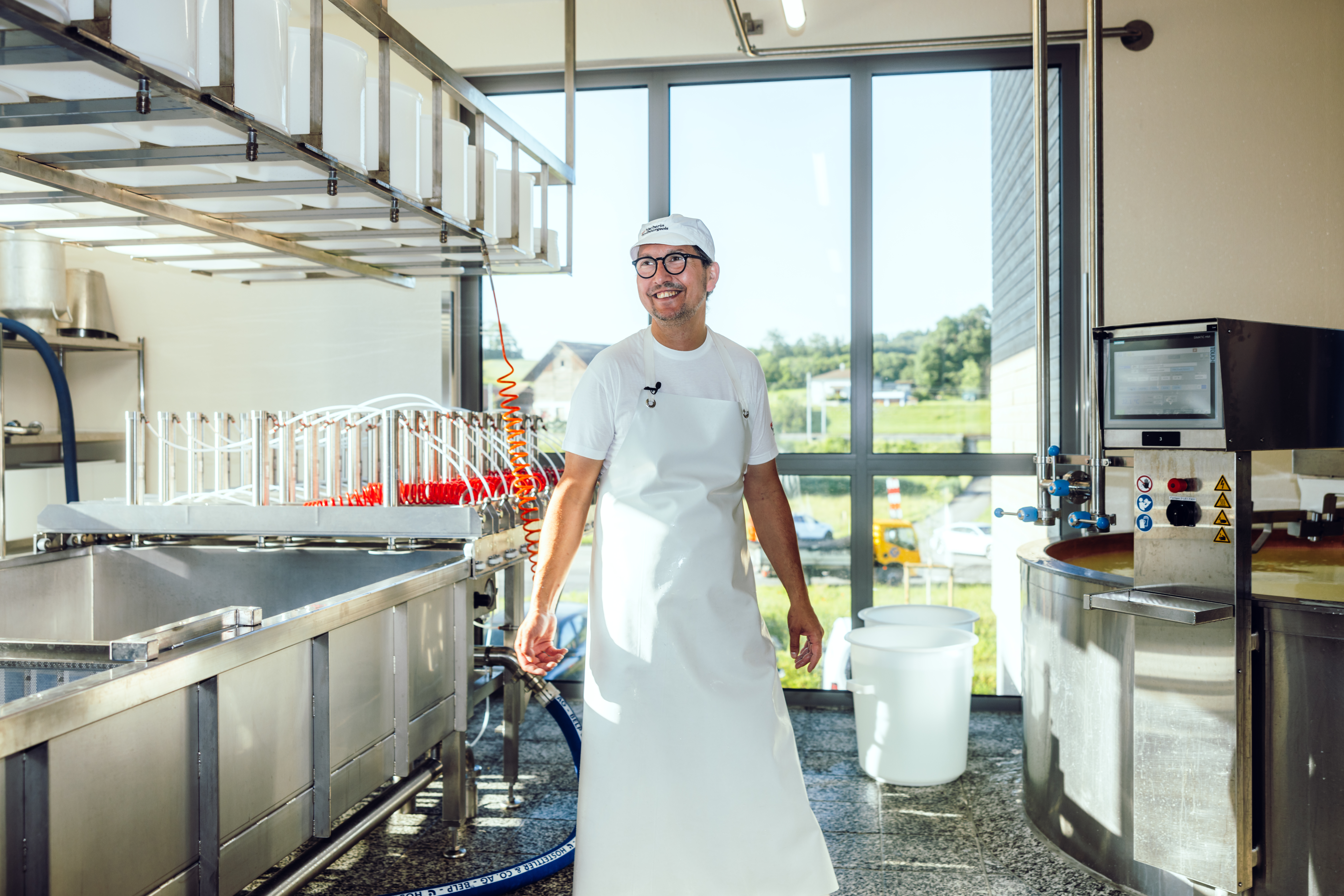The family business Fromages Spielhofer SA is constantly looking for new ways to achieve greater sustainability – from production to packaging.

Reducing plastic with hybrid packaging
A whole Tête de Moine AOP is usually bought for a special occasion such as Easter or Christmas. This cheese is conveniently available almost everywhere in the shape of pared rosettes. The drawback is that a lot of plastic is needed to preserve the Tête de Moine AOP when it is sold pared in the shape of rosettes. Samuel Villiger, Head of Hybrid Project and Member of the Board at Fromages Spielhofer SA, is well aware of this problem. Which is why he and his team have been working to find more sustainable packaging solutions. No easy task, especially as there are a number of factors to consider, such as stabilising the cheese, preventing it from maturing further and ensuring it does not dry out. Furthermore, the production costs must be economically viable.
To achieve this, a fully hybrid and hybrid packaging (second skin light) was developed. The system is the same: a container made from recycled PET and a cardboard liner, which replaces the thicker plastic container previously used. The cardboard can be separated from the plastic film and recycled. The cardboard surface provides an additional space for communication media.
The difference between the full hybrid and the hybrid packaging (second skin light) is firstly the plastic content. The full hybrid solution reduces plastic content by 65% and the hydride solution by 50%. Secondly, it reduces the proportion of cardboard and the production costs. The hybrid solution (second skin light) is produced much more efficiently and uses less cardboard, thus reducing production costs. The hybrid packaging (second skin light) will be introduced at Migros Basel this year – other regions will follow. The full hybrid containers are already in use in the company's own cheese shops and will soon also be available at Coop Fine Food.
Fleurolle and ‘Tide’ join forces
Not everyone owns a Girolle, Fleurolle or similar appliance at home to pare a whole or half Tête de Moine into fine rosettes. That is why they can be bought as sets. Fromages Spielhofer SA also offers these sets. A small cheese and a mini plastic Fleurolle. This combination is primarily targeted at foreign markets, as Samuel Villiger points out: “Many people in Switzerland own a wooden Girolle, but that's not the case in foreign markets.”
Thanks to a partnership with ‘Tide’, the Fleurolle has been made from plastic recovered from the world’s oceans since 2023. The ocean-bound plastic is sourced as granulate and moulded by a local partner in St-Imier five minutes from Fromages Spielhofer SA. This not only makes production more sustainable, but also eliminates transport costs, which is economically advantageous compared to production in Asia.
Fromages Spielhofer SA is currently the first company in the food sector to receive the ‘Tide’ certification for ocean-bound plastic.
Tide ocean material
‘Tide’ is a Swiss company that gives ocean-bound plastic waste a second life. They do this by working closely with local communities to close the cycle of plastic waste pollution. Its ‘tide ocean material®’ was developed in close collaboration with the Swiss University of Applied Sciences and is certified to industry standards. The ‘Tide’ upcycling process produces up to 80% less carbon emissions than the production of new plastic.
Carbon neutral production in Sonvilier
The Spielhofer family not only produces, sells and exports Tête de Moine AOP, but also runs a cheese dairy in Sonvilier that exclusively produces Gruyère AOP. Here, too, the company is taking further steps towards sustainability – thanks to state-of-the-art technology and the use of renewable energy, the entire production process at Sonvilier is carbon neutral.


